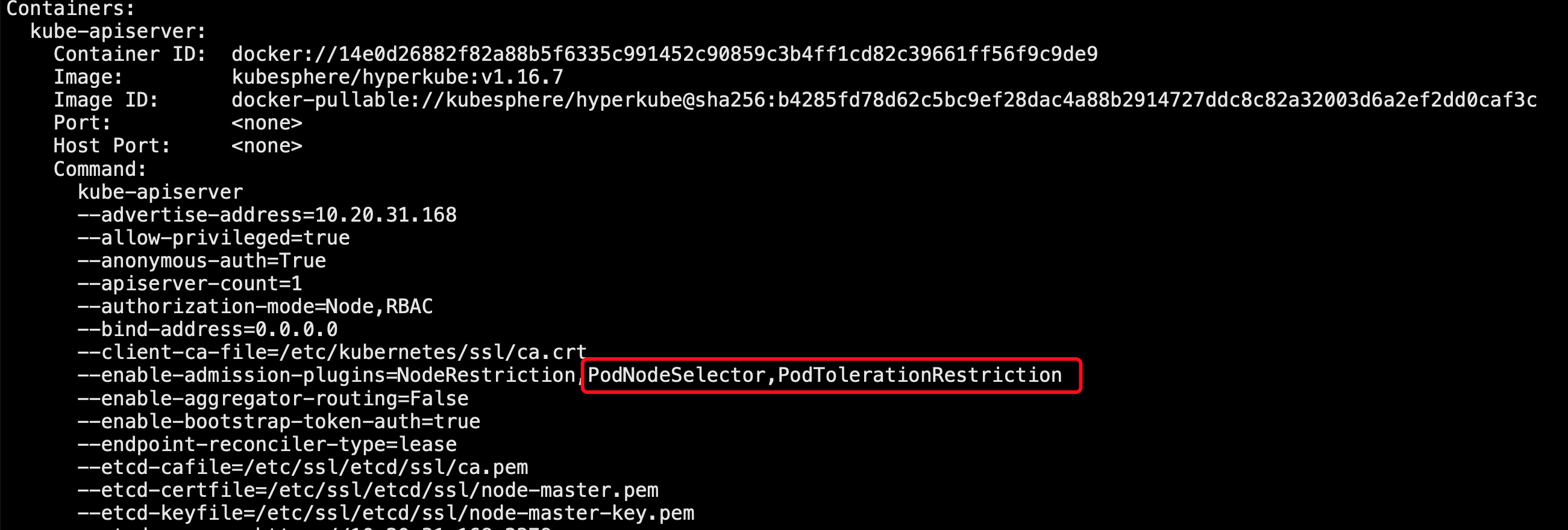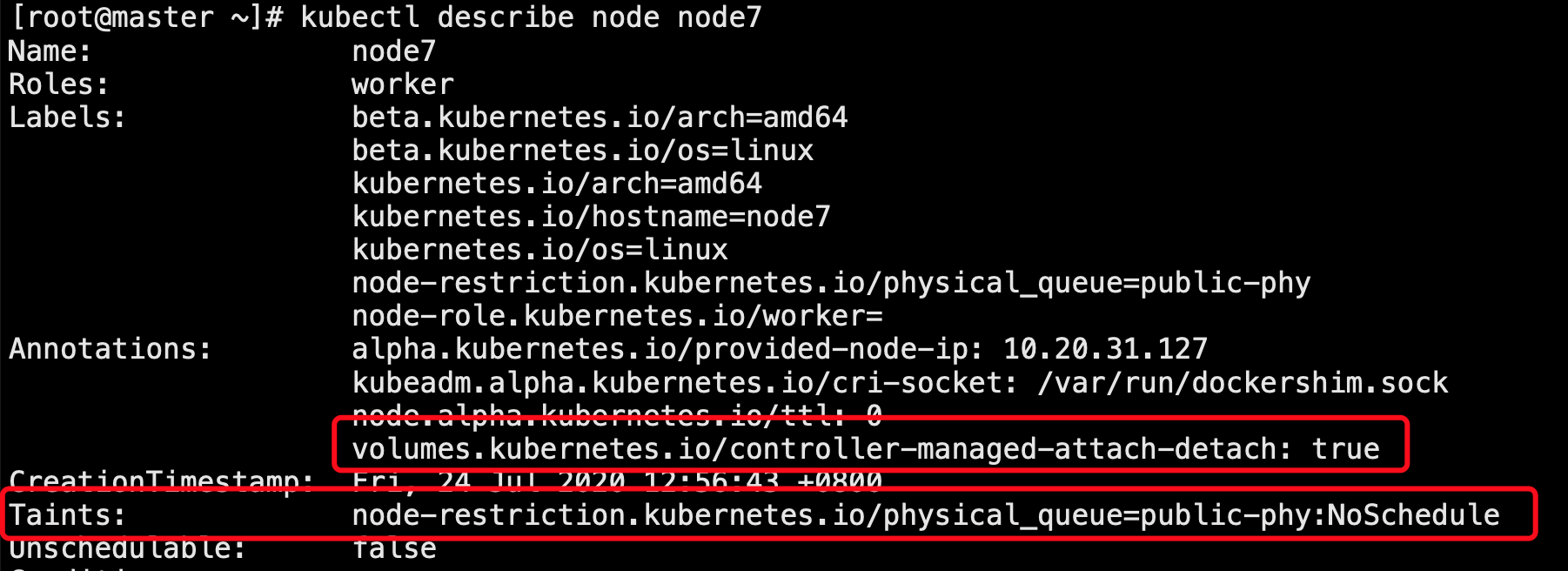Kuberntes 目前在实际业务部署时,有两个流派:一派推崇小集群,一个或数个业务共享小集群,全公司有数百上千个小集群组成;另一派推崇大集群,每个AZ(可用区)一个或数个大集群,各个业务通过Namespace的方式进行隔离。
两者各有优劣,但是从资源利用率提升和维护成本的角度,大集群的优势更加突出。但同时大集群也带来相当多的安全、可用性、性能的挑战和维护管理成本。
本文属于Kubernetes多租户大集群实践的一部分,用来解决多租户场景下,如何实现传统的物理队列隔离。
物理队列并不是一个通用的业界名词,它来源于一种集群资源管理模型,该模型简化下如下:
- 逻辑队列(Logical Queue):逻辑队列是虚拟资源分配的最小单元,将虚拟资源配额(Quota)配置在逻辑队列上(如CPU 200 标准核、内存 800GB等)
- 逻辑队列对应Kubernetes的Namespace概念。参考Resource Quotas
- 不同的逻辑队列之间可以设置Qos优先级,实现优先级调度。参考Limit Priority Class consumption by default可以限制每个Namespace下Pod的优先级选择
- 配额分两种:Requests(提供保障的资源)和Limits(资源的最大限制),其中仅Requests才能算Quota,Limits 由管理员视情况选择
- 物理队列(Physical Queue):物理队列对应底层物理机资源,同一台物理机仅能从属于同一个物理队列。物理队列的资源总额就是其下物理机可提供的资源的总和。
- 物理队列当前在Kubernetes下缺乏概念映射
- 逻辑队列和物理队列是多对多绑定的关系,即同一个逻辑队列可以跨多个物理队列。
- 逻辑队列的配额总和 / 物理队列的资源总和 = 全局超售比
- 租户:租户可以绑定多个逻辑队列,对应关系仅影响往对应的Namespace中部署Pod的权限。
资源结构如图所示:
1、原理
物理队列实现:
- 给节点配置Label和Taint,Label用于选择,Taint用于拒绝非该物理队列的Pod部署。
和Namespace的自动绑定的原理:
- 配置两个
Admission Controller:PodNodeSelector和PodTolerationRestriction,参考Admission Controllers - 给
Namespace增加默认的NodeSelector和Tolerations策略,并自动应用到该 Namespace 下的全部新增 Pod 上,从而自动将Pod绑定到物理队列上。
2、配置
2.1 集群开启Admission Controller: PodNodeSelector,PodTolerationRestriction
我是在已经运行的k8s集群开启PodNodeSelector,PodTolerationRestriction准入控制的,不能直接使用kubectl edit命令编辑kube-apiserver这个pod,直接加保存时报错,需要修改修改 /etc/kubernetes/manifests/kube-apiserver.yaml配置文件
- --enable-admission-plugins=NodeRestriction,PodNodeSelector,PodTolerationRestriction
修改配置文件后立刻生效,之后查看kube-apiserver这个pod被重启了,这样就修改完成了。

2.2 创建 Namespace
apiVersion: v1
kind: Namespace
metadata:
name: public
annotations:
scheduler.alpha.kubernetes.io/node-selector: "node-restriction.kubernetes.io/physical_queue=public-phy"
scheduler.alpha.kubernetes.io/defaultTolerations: '[{"operator": "Equal", "effect": "NoSchedule", "key": "node-restriction.kubernetes.io/physical_queue", "value": "public-phy"}]'
# scheduler.alpha.kubernetes.io/tolerationsWhitelist: '[{"operator": "Equal", "effect": "NoSchedule", "key": "node-restriction.kubernetes.io/physical_queue", "value": "public-phy"}]'
此处要点:
- 文档有问题,toleration 配置是一个list,配置错误在部署时会提示解析JSON错误
- tolerationsWhitelist配置后,就算配置有defaultTolerations且相同,也需要在Pod中指定对应的toleration,所以不能配置
- NoSchedule 已经足够限制,无需 NoExecute,Node配置的时候同样配置,此处可根据需求进行选择。
- 物理队列的前缀建议为
node-restriction.kubernetes.io/physical_queue,此处是根据文档的建议,后续可以配合NodeRestriction admission plugin限制kubelet自定配置 - 目前Namespace尚不能绑定多个物理队列:
- NodeSelector 无法支持in语法,见 4
- defaultTolerations 可以配置多个 Torleration
2.3 给Node绑定物理队列
kubectl label node node7 node-restriction.kubernetes.io/physical_queue=public-phy kubectl taint nodes node7 node-restriction.kubernetes.io/physical_queue=public-phy:NoSchedule

3、测试
3.1 测试的Deployment如下
apiVersion: apps/v1
kind: Deployment
metadata:
name: nginx-deployment
labels:
app: nginx
spec:
replicas: 3
selector:
matchLabels:
app: nginx
template:
metadata:
labels:
app: nginx
spec:
containers:
- name: nginx
image: nginx:1.14.2
ports:
- containerPort: 80
3.2 验证提交到指定物理队列中的Pod默认增加NodeSelector和Toleration
kubectl apply -f nginx_deployment.yaml --namespace public

kubectl describe pod nginx-deployment-574b87c764-khmd7 -n=public

3.3 验证和物理队列中指定的NodeSelector冲突的Pod无法提交
kubectl delete deployment nginx-deployment --namespace public
# 修改nginx_deployment.yaml ,增加spec.template.spec.nodeSelector
nodeSelector:
node-restriction.kubernetes.io/physical_queue: second-phy
# 验证能否部署
kubectl apply -f nginx_deployment.yaml --namespace public
# 查看deployments
kubectl describe replicaset nginx-deployment-585fcd8d7d --namespace public
Warning FailedCreate 49s (x15 over 2m11s) replicaset-controller Error creating: pods is forbidden: pod node label selector conflicts with its namespace node label selector
4、相关问题
Q: NodeSelector无法使用Set-based语法,导致逻辑队列(NameSpace)无法绑定多个物理队列
后续考虑使用Node Affinity配置节点亲和性。但是目前并没有现成的Adminssion Controller去给Namespace绑定默认的节点亲和性,如有需求需要自己开发。
NodeSelector 和 Toleration 的功能,可以被 Node Affinity 进行替代,且后者提供更高级的调度功能,后续尝试是否基于此进行资源调度的整体设计。
此外Node Affinity还可以实现一个逻辑队列绑定多个物理队列的情况下,配置物理队列的调度权重的功能,即优先部署到某个物理队列。
参考:https://github.com/ninehills/ninehills.github.io/issues/77
